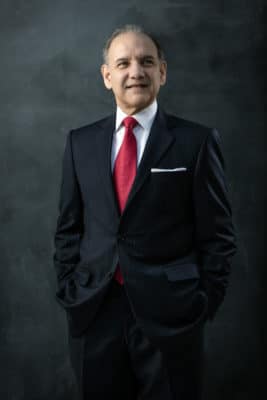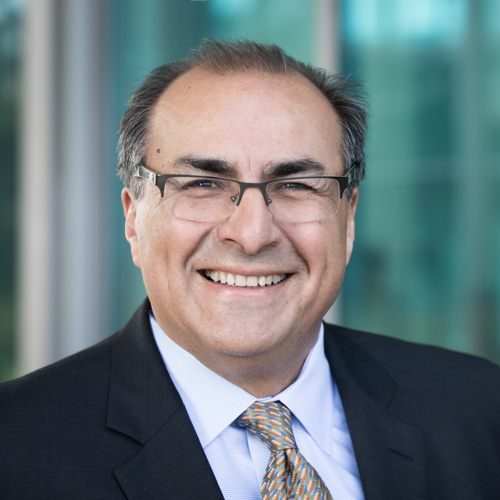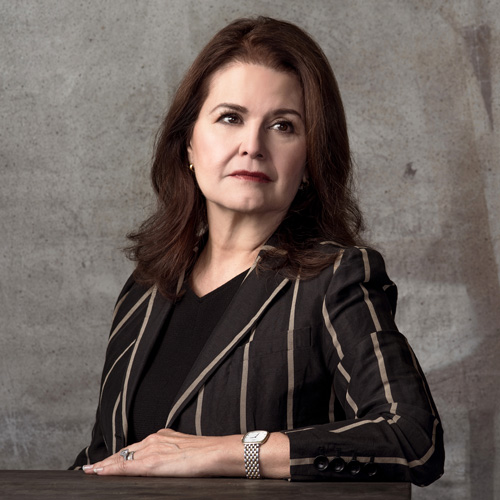
What does it take to serve on a board of directors? According to Michael Montelongo, it requires, in part, as much diverse experience as possible. Montelongo—a National Association of Corporate Directors board leadership fellow and board director for various organizations including Herbalife—brings what he describes as “tri-sector” experience that spans the public, private, and civic sectors of society.
“The heart of a board’s work is making choices that shape a company’s future, so it’s imperative that a board’s experience mix is robust, deep, and wide,” he asserts. “That is why the global business climate of today and tomorrow increasingly seeks those who are multisector fluent. I believe that kind of credential enables one to speak credibly about the nexus among the different sectors and across a wide range of subjects—commercial, regulatory, or the Latino market.”
The oldest of three, Montelongo is the son of Miguel, a Tejano, and Elena, a Puertorriqueña. Fate and military service brought his parents together during the Korean War when the US Army assigned Miguel to New York City’s Governor’s Island and Elena moved to NYC from Puerto Rico.
“Angels along the way” is how Montelongo describes the many guiding mentors he has had throughout his career, starting with his parents. They were poor and their formal education ended before high school, but they made every sacrifice to send their children to parochial schools for a quality college preparatory education and a chance at achieving the American Dream.
Board Snapshot
Herbalife (NYSE:HLF), Board of Directors
Exostar LLC, Board of Directors
Leadership Roundtable, Board of Directors
They succeeded and, along with his other angels, instilled an abiding sense of selfless service and its nobility into his DNA. Today, he runs GRC Advisory Services, based in Scottsdale, Arizona, and draws from his executive time in many companies and service at Herbalife and other corporate and nonprofit boards, including Be the Change, an organization that encourages young people to serve the country by signing up for a full-time service year.
He also draws on his considerable national security experience, starting as a cadet at West Point. Then he served as an Army Ranger-qualified officer, followed by an Army fellowship at Harvard Business School and a congressional fellowship in the US Senate. In 2001, President George W. Bush appointed Montelongo as assistant secretary of the Air Force for financial management and comptroller in the US Defense Department, becoming the first Latino appointed as the Air Force chief financial officer.
“Beyond these very meaningful experiences, the mottos of all the military services represent a ‘mission first, people always’ commitment and service ethos that is ingrained in me and is a best practice ‘tone at the top’ governance culture boards aspire to create,” he says.
This was tested on September 11, 2001, when he found himself at ground zero in the Pentagon serving as the Air Force CFO. When American Airlines Flight 77 hit the Pentagon, he says he felt the building shake violently, but the gravity of that moment struck him once he evacuated the Pentagon and attempted to reach his family. Cell phone lines were jammed, so it took more than five hours before he could let his wife know he was safe.
“When I finally returned home, reuniting was very emotional,” he shares. “The next day, I became a wartime CFO resourcing two major combat operations, Enduring Freedom and Iraqi Freedom [Afghanistan and Iraq]. Clearly 9/11 was a crucible event, but having lived through it, I’m grateful I could serve and contribute with my colleagues to leave the organization better off than I found it.”
“Service to others and leading by serving are guideposts that all my ‘angels along the way’ impressed on me; board service is another expression of that conviction,” he reflects.
Besides having multisector expertise, Montelongo advises: “Approach the task of directorship as a noble mission. I encourage board peers and aspirants to consider board service more than a responsibility—it is a vocation, a privilege, and an honor to serve. I enjoy enhancing the economic sustainability of the corporate enterprise and bolstering stakeholder confidence.”
He puts this into practice in his board work at Herbalife, where he’s particularly proud to be one of three Latino directors along with former Surgeon General Dr. Richard Carmona and former Undersecretary of State Maria Otero. Herbalife is the only Fortune 1000 company with that kind of US Hispanic representation on its board.
 In the Director’s Seat With Esther Aguilera
In the Director’s Seat With Esther Aguilera
Esther Aguilera: Your experience on 9/11 at Ground Zero in the Pentagon must have tested you. Which of your multi-faceted career experiences, leadership qualities, and personal values did you turn to most during that troubling incident?
Michael Montelongo: 9/11 was a seminal tragedy—a national crisis of horrible proportions whose scale, scope, and impact far exceeds anything most organizations and teams will ever face. So on that day and repeatedly thereafter, I turned to my faith, family, community, and team, and all I learned in my military service about duty, resiliency, perseverance, and selfless service for hope and strength. The intensive training one gets in the military—which is also true of our first responders—emphasizes calm in the face of adversity and a strong “mission first, people always” ethos that requires completing one’s job and focusing on the welfare of one’s team. So after seeing to my family’s needs because they were my immediate concern, my priorities were the mission and my team. While such crises can shake us to our core, they can also serve to build our commitment, character, and determination to serve and make a difference in a very impactful way.
EA: Can you relate the troubleshooting and emergency response that you experienced as Air Force CFO on 9/11 at the Pentagon to any of your
board experiences?
MM: No one is immune to crisis—it’s the new global norm—so boards and management teams must have “crisis veterans” in the boardroom, leaders who are proactive and prepared and, when the unexpected strikes, can take a serious blow and bounce back because it’s the effectiveness of the response that matters. The skills I developed during my military and government career translate effectively in the boardroom, especially during crisis situations It’s a playbook that has enabled me to navigate many a boardroom situation requiring crisis management insight.

